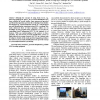Free Online Productivity Tools
i2Speak
i2Symbol
i2OCR
iTex2Img
iWeb2Print
iWeb2Shot
i2Type
iPdf2Split
iPdf2Merge
i2Bopomofo
i2Arabic
i2Style
i2Image
i2PDF
iLatex2Rtf
Sci2ools
ICPR
2010
IEEE
2010
IEEE
EEG-based Personal Identification: from Proof-of-Concept to A Practical System
Although the concept of using brain waves, e.g. Electroencephalogram (EEG), for personal identification has been validated in several studies, some unanswered practical and theoretical questions prevent this technology from further development for commercialization. Based on a well-designed personal identification experiment using EEG recordings, this study addressed three of these questions, which are (1) feasibility of using portable EEG equipment, (2) necessity for controlling factors influencing EEG, (3) the optimal set of features. With our understanding of the answers to these questions, the EEG-based personal identification system we built achieved an average accuracy of 97.5% on a dataset with 40 subjects. Results of this study provided supporting evidence that EEG-based personal identification from proof-of-concept to system implementation is promising. Keywords-EEG; biometircs; personal identificaiton; portable EEG recording equipment
Computer Vision | EEG Recording | EEG-based Personal Identification | ICPR 2010 | Personal Identification |
Related Content
| Added | 12 Feb 2011 |
| Updated | 12 Feb 2011 |
| Type | Journal |
| Year | 2010 |
| Where | ICPR |
| Authors | Fei Su, Liwen Xia, Anni Cai, Yibing Wu, Junshui Ma |
Comments (0)

